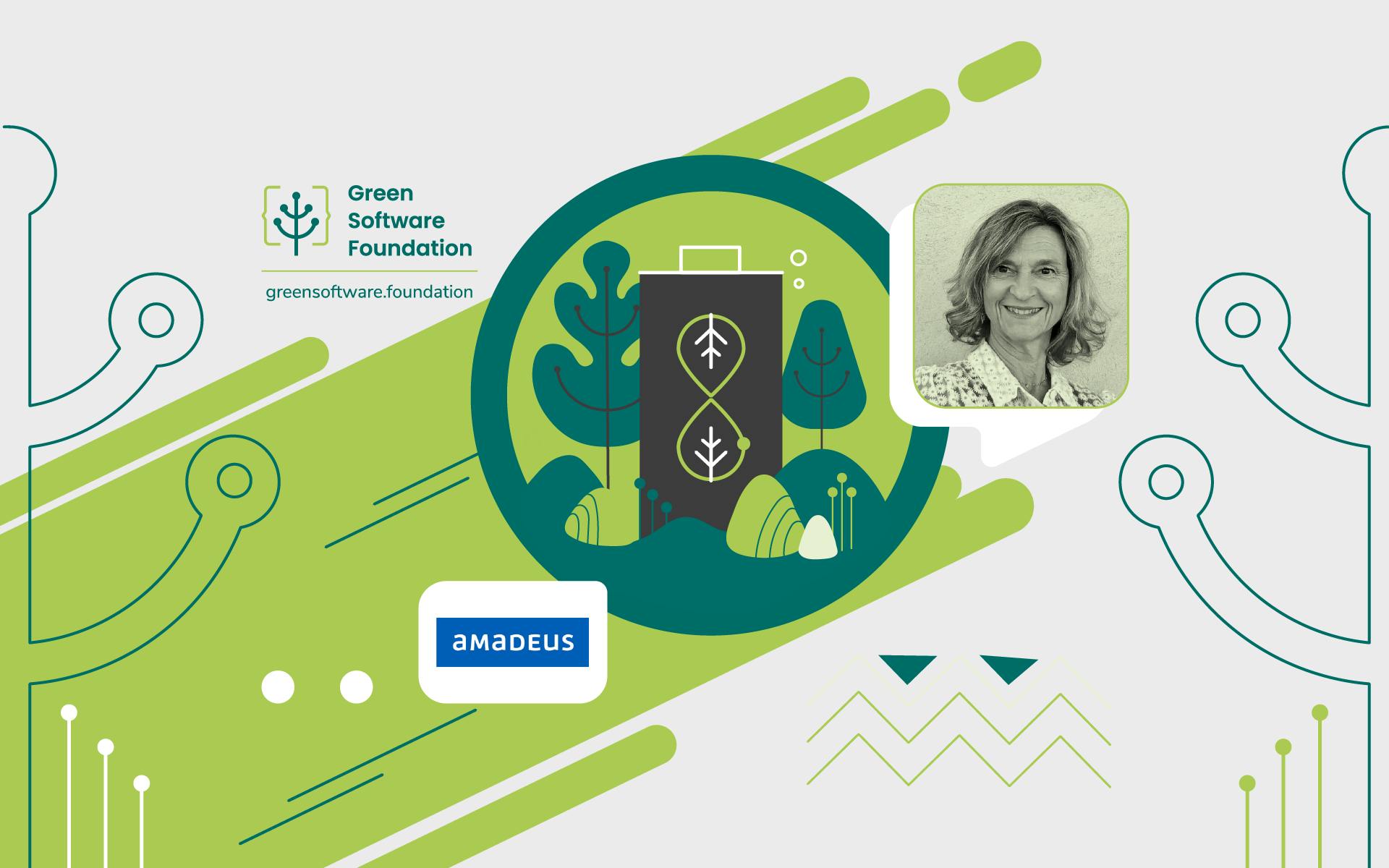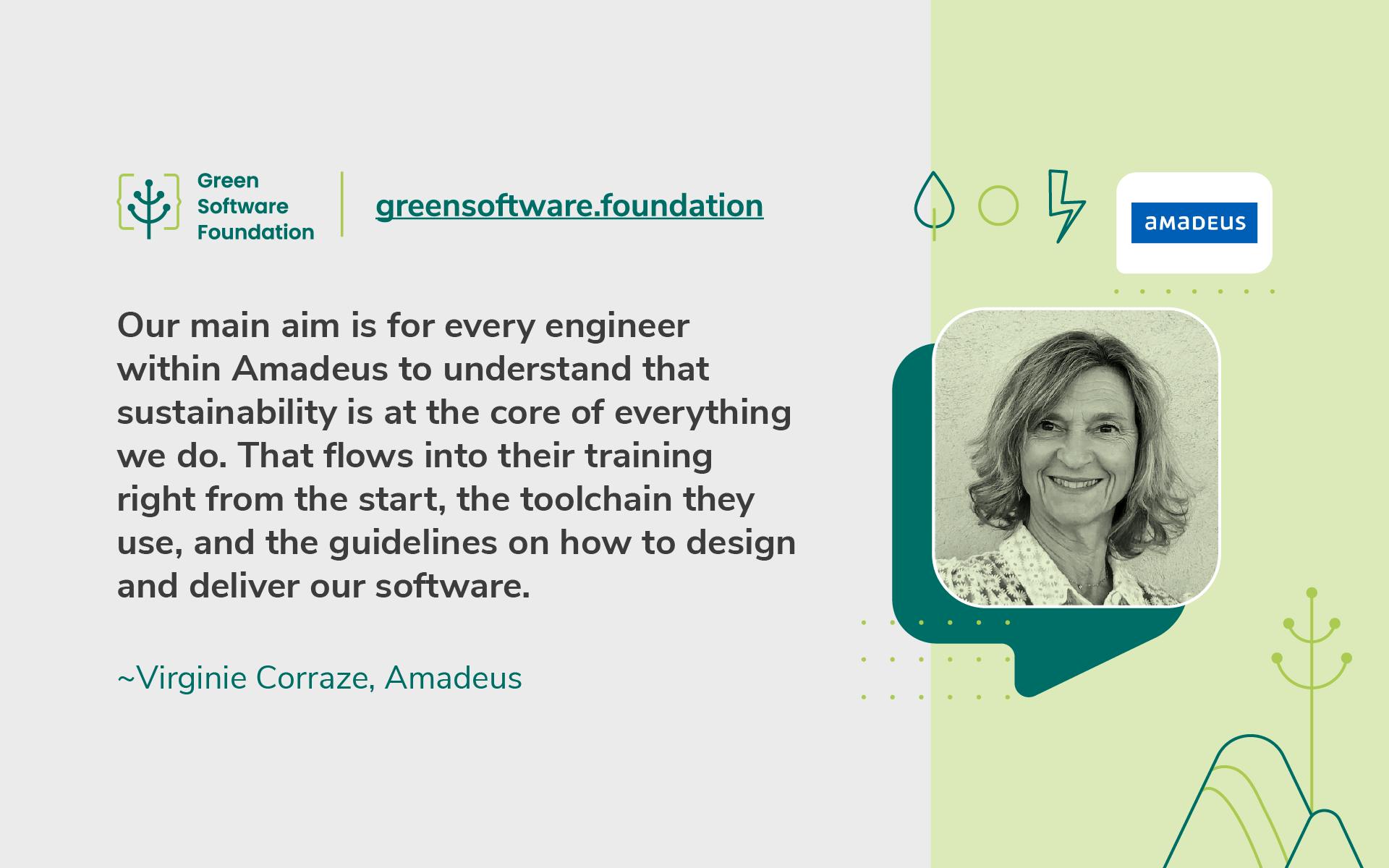Meet Virginie Corraze, Associate Director, Engineering Quality & Sustainability, Amadeus
The travel technology solutions provider includes sustainability as an important pillar for its future and the future of the travel industry. Amadeus is developing various initiatives and taking concrete actions aiming to create a more responsible and sustainable travel industry, starting by reducing the impact of their own operations. Joining GSF comes as a natural move for Amadeus routed in the desire to do more when it comes to sustainability.
Can you give us an idea about the solutions Amadeus provides?
Simply put, we power travel. Amadeus offers IT solutions that connect travelers to the journeys they are seeking, be it through travel agents, search engines, tour operators, airlines, airports, hotels, car rentals, and railways.
We have developed technology solutions in partnership with the travel industry for over 30 years. We combine a deep understanding of how people travel with the ability to design and deliver the complex systems our customers need. An example would be boarding applications for airlines or hotel search functionalities for travel providers. In 2019, we helped connect over 1.9 billion people to local travel providers in over 190 countries. We are a global company with a local presence, wherever our customers need us.
We are passionate in our pursuit of better technology that makes better journeys.
What is your role with Amadeus, and how did you get there?
I have more than 25 years of experience in IT and travel. With Amadeus, I’ve held various roles in product definition, product management as well as implementing the methodology to migrate airlines to our solutions. I am now in charge of Engineering Quality and Sustainability, a transversal team across the whole engineering community. We define the Quality and Green IT strategy including methodology, tooling, programs and leading the related communities to have an aligned and collaborative approach for the operational engineering teams.
What is your main goal concerning sustainability within Amadeus?
Our main aim is for every engineer within Amadeus to understand that sustainability is at the core of everything we do. That flows into their training right from the start, the toolchain they use, and the guidelines on how to design and deliver our software. The key is to give them the tools for measuring the impact of any of the decisions they make, specifically with regard to sustainability.
This focus on sustainability is crucial for the future of the planet as well as that of the travel industry. Professionally, I think it's also an exciting intellectual challenge and provides purpose for our engineers. Changing our mindset is front and center to me: we have to move towards a technology that is more energy efficient.
Where does the urge for sustainability come from?
Environmental sustainability and climate action have become crucial topics for the travel and tourism industry in recent years. As an important player in the industry, we acknowledge our responsibility to collaborate with others and contribute to creating a more sustainable future.
We have been reinforcing our environmental sustainability strategy, which is based on three pillars: (1) Responsibility: addressing the environmental efficiency of our operations; (2) Commitment: supporting our customers with our sustainability value proposition; and (3) Collaboration: with industry stakeholders in joint sustainability initiatives.
Creating a more sustainable industry is a challenge that all travel players face, only by collaborating and working together will we be able to reach the industry’s goal of being Net Zero 2050. We’re seeing increased interest from customers as well as employees. Customers are looking for low carbon solutions and employees often ask in job interviews what we are doing for the environment.
What do you plan to achieve together with the GSF?
By joining GSF, Amadeus can connect, collaborate and share experiences with other businesses, academic institutions, start-ups, and non-profit bodies leading in the domain of green IT. Some of our engineers will join GSF workshops as early as next week to learn and contribute to building standardized sustainable engineering practices. This, in turn, will allow us to share sustainable coding practices across our organization more quickly. We will work together to find ways to minimise our impact on the environment.
Amadeus will also collaborate on open-source sustainability projects accessible to developers worldwide. We intend to propose open-source projects relevant to the scope of GSF to foster development. We see sustainability as an intrinsically collaborative process. We also want to contribute significantly to the standards workgroup and, personally I’ll join the community workgroup.
In addition, Amadeus will be using GSF standards and guidelines, such as the Software Carbon Intensity (SCI) score computation. We will apply SCI as an internal measure for the most extensive Amadeus application in terms of volumes of transactions migrating to the cloud. This will allow us to compute and monitor the application's carbon emissions rate and help us implement optimizations. We are excited to start using this methodology.
How does your organization see the future of green software?
At Amadeus, we recognize that sustainability is a challenge faced by all in the travel industry and, by definition, we need to work collaboratively to provide global solutions. In this context, Amadeus has been reinforcing its strategy to address environmental concerns in cooperation with stakeholders and leaders from both travel and technology.
Internally, we are reviewing our engineering practices to include sustainability considerations and related optimization. As an example, we are currently working with IATA (International Air Transport Association), on a travel search efficiency and sustainability initiative, in the scope of the New Distribution Capability model. Our goal is to use artificial intelligence to process fewer travel search queries with a low probability of converting and propose offers more relevant to the customer as opposed to providing them with a large volume of suggestions.
A key enabler of green software is the move of all our applications to the cloud, as we will leverage our cloud provider efficiencies in terms of power usage effectiveness as well as cost reduction related to software optimization, led by cloud finance operations (FinOps) which enables organizations to maintain financial accountability for cloud services.
What challenges do you see ahead, and how can we overcome them?
The travel industry is currently undergoing a renewal process. Travelers are looking for a more sustainable travel experience; they are more conscious and demanding on this topic. The industry needs to address this demand and act on it. The sooner that happens, the better for us as a company and industry, as well as for travelers and communities.
However, in the challenge lies the opportunity. For Amadeus, that means the development of IT solutions that help to inform travelers about impact of their travel on sustainability as well as the availability to provide sustainable travel options and to help travel providers improve the environmental efficiency of their operations. These solutions can improve customer conversion, loyalty, and reputation.
We must also evolve from the trend of ever-growing capabilities towards greater efficiency and customization. Artificial intelligence is a big part of that. It is an exciting challenge for our developers to build elegant and efficient code that can do more with fewer resources. The challenge will be to ensure education around this change in trend.
Along with the move of applications to the cloud, other areas such as FinOps can also support that mindset change. For instance, smartphone users will likely become thriftier about their use of data if they are actively informed about their usage and the emissions linked to it. The same applies to cars; live fuel consumption triggers changes in driving habits toward more fuel efficiency. FinOps will support this kind of evolution for software.
It seems that Amadeus is making significant steps. Are there any other sustainability initiatives that you can share?
Sustainability has been a focus of Amadeus for some time. I can give you a few examples of Amadeus’ commitment:
· Our carbon-neutral facility - Amadeus Data Center
· Our investment and partnership with CHOOOSE provides detailed emissions information as well as climate action options to travelers looking to take actions to prioritize the impact of travel on the climate.
· Travel4Impact - an initiative to foster digitalization, collaboration, and sustainability as part of the value proposition for SMEs in the travel and tourism industry.
· Green is the New Blue - an initiative to build awareness of the importance of sustainability and build meaningful corporate partnerships.

This article is licenced under Creative Commons (CC BY 4.0)
